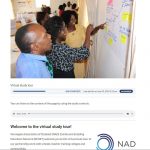Over the last year we have all found ourselves in an unusual situation. Our theme for the next edition therefore draws on the work being done to support children’s learning as we have adapted to the COVID-19 pandemic and school closures. It will also look at the broader context of what it means to learn at home.
The theme for the 2021 edition of Enabling Education Review will be:
“Home learning”
The deadline for submitting first drafts of articles is 31 March 2021. *EXTENSION – new deadline now 30 April 2021*
Details of suggested topics and how to submit articles are provided below.
Contact info@eenet.org.uk with any questions.
Why have we chosen this topic?
Many children learned at home before the COVID-19 pandemic for various reasons. For example, they may have been denied access to school, or their parents may have chosen home schooling as their preferred approach. Plus of course most children experience a great deal of informal learning at home, even if they also go to school.
Learning at home has often been seen as separate from mainstream education and not part of the movement towards inclusive education. EENET has always argued that, with the right strategies, approaches and support in place, learning at home can be considered an integral contribution to an inclusive education system.
Over the last year, COVID-19 school closures meant millions of children suddenly had to learn at home, and their teachers and education ministries had to work out how to facilitate that. One of the biggest challenges has been ensuring that learning at home is inclusive of every learner.
In early 2020 EENET, through our partnership with Norwegian Association of Disabled, launched a project to explore home learning and the education experiences of stakeholders during the widespread lockdowns. Using evidence from a survey, we developed a home learning guidance poster and booklet for families. These resources recognise that home education can be extremely stressful for learners and families, especially in the context of the COVID-19 pandemic. They also show that home learning is always relevant, whether or not schools are open, and we can do more to weave effective learning at home into high quality inclusive education systems.
What has been your experience as a teacher, parent, family member, learner, or other stakeholder involved in education? Was home learning a new experience for you during the pandemic, or is it something you have been involved with for a long time? How do you cope with or support learning at home? What works well and what is challenging? What support did or do you receive, or would you like to receive?
What could you write about?
There are many aspects of home learning that you could write about, including but not limited to:
- What has been done to ensure emergency-response or long-term home learning initiatives promote inclusion and are inclusive for all learners?
- How are inclusive home learning initiatives financed and managed?
- As a parent/caregiver/learner – how have you advocated at the local or national level for home learning provision to be more inclusive.
- As a teacher – what did you do to reach and support all your learners when schools were closed? What problems did you solve to help you reach and support more/all learners? Who helped you?
- For learners who were already learning at home before the pandemic, how has their home learning been affected (positively or negatively) by the changes in the education system resulting from the COVID-19 pandemic?
- How have approaches to learning changed as a result of responsibility for learning shifting heavily onto parents and families for prolonged periods?
- How does home learning affect the mental and physical well-being of learners, parents, families, and teachers?
- What lessons have we learned from the COVID-19 home learning experiences that we could use to improve the design and inclusivity of education systems long term?
Enabling Education Review helps people share and learn from each other’s experiences. We therefore welcome articles that offer practical insights, to help others who are looking for ideas that they can adapt and try. We like articles that provide a little background to the context, project or programme, and then explain in more detail the activities that happened (what, where, when, with or by whom, and why). We also like to read about the results, if possible.
For more information on how you can submit an article please download the full call for articles.
Call for Articles (Arabic).

